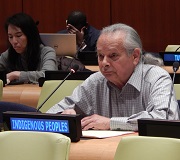
Consultations on the participation of indigenous peoples at the UN commenced
On 7 March, the President of the General Assembly Mogens Lykketoft convened an informal briefing on the consultations on possible measures to enable the participation of indigenous peoples’ representatives and institutions in the United Nations. Mr. Lykketoft initiated the meeting by extending his condolences to the family, friends, and colleagues of the environmental and indigenous rights activist Berta Cáceres, who was murdered a few days earlier, in Honduras.
“Her death is a reminder to all of us of how perilous life can be for indigenous activists and how important it is that we, the international community, help to ensure the respect, promotion and protection of rights of the indigenous peoples,” he said.
During the event, Mr. Lykketoft, together with the four advisers appointed to assist him in conducting the consultation process, presented a roadmap on how they intend to move forward. They also listened to inputs from Member States and indigenous peoples’ representatives.
The briefing was organized to respond to the resolution on the Rights of Indigenous Peoples from 2015, following up on the commitments of the outcome document of the 2014 World Conference on Indigenous Peoples. In the resolution, the General Assembly requested its President to prepare a compilation of the views presented during the consultations, which will be the basis for a draft text to be adopted by the General Assembly during its seventy-first session.
The two advisers from Member States (H.E. Mr. Kai Sauer, Permanent Representative of Finland and H.E. Mrs. Martha Ama Akyaa Pobee, Permanent Representative of Ghana), as well as the two advisers from indigenous peoples (Dr. Claire Charters of the Pacific Region and Dr. James Anaya of the North America region), underscored the importance of ensuring that indigenous peoples effectively participate in decision-making.
“Indigenous peoples’ right to participate in decision-making is a human right supported by human rights instruments and also by international human rights jurisprudence,” Dr. Claire Charters said. However, “Indigenous peoples’ decision making is not always respected at the domestic level and there are difficulties at the international level for indigenous peoples to participate fully,” she added.
The process will continue with an electronic consultation from 8 March until 8 April 2016, followed by in person consultation meetings over the summer including during the annual session of the Permanent Forum on Indigenous Issues from 9-20 May 2016. Member States and indigenous peoples are invited to participate and to send their proposals to ipadvisers@un.org.

Follow Us